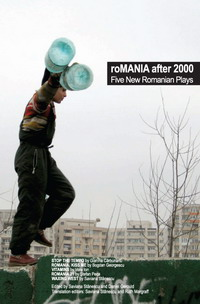|
 |
Three
Romanian Playwrights in New York City
Romanian Drama on the
Edge of a Big Jump |
|
" roMANIA
after 2000" - the first anthology of
new Romanian drama published in the United States |
by Adina Dabija |
The recurring patterns of history, the
global warming, the human race decay in a decaying world and
love as the only possibility to escape reality are the themes
of the most recent works presented by
three of the most talented contemporary Romanian playwrights in
a recent reading performance at the
LARK Development Play Center, New York.
The
readings of Gianina Carbunariu and Peca Stefan are
the
result of the Artslink Residencies they have been awarded this
year, benefiting also from the support of Romanian
Cultural Institute's
New Drama Support Program (artistic director: Saviana Stanescu).
The two playwrights worked in
collaboration with the LARK Play Development Center and the Long
Wharf Theatre, respectively.
Saviana Stanescu is a well-known
Romanian playwright residing in New York City. She is currently a
NYSCA playwright-in-residence with Women's Project and
writer-in-residence for East Coast Artists. She also teaches in
the Drama Department of New York University's Tisch School of the
Arts.
Listening to their works-in-progress, I had the feeling
that the Romanian drama is on the edge of a very important
change. A more "out of the box" (where box = Romania) way of
dealing with reality has changed these authors'
voices and perspectives. Living in such a
multi-cultural space as New York, even for a short time, probably
contributed a lot to this change. I am not sure if purposely or not all
three authors focused on universal issues of "the more or
less distant future", past and present - to paraphrase the title
of Geanina's play. Redefined about five
years ago by DramAcum movement, to which many young
Romanian playwrights subscribed, Romanian drama focused for a
while on local, "now and here" issues: sky rocking
prostitution, abandoned children, corruption etc. The same
phenomenon occurred in Romanian movies and music. Extremely talented
Romanian artists made themselves a title of honor by working on ghetto style
projects, considered very trendy and believed to sabotage the
arthritic official cultural establishments who, on their part,
continued without blinking to distribute
public funds based on very shaky criteria. As the
world is opening more and more to Romania and projects like this
will become more common, the challenge will be to adjust the dramatic text to
different cultural contexts.
Beyond these general considerations, all the three
texts presented on November 7th at Lark Theatre were
interesting and very well written. Saviana Stanescu brought
us a delicate and powerful text entitled For a Barbarian
Woman, in which she attempts to make a parallel between
the Roman and the American values infused in to the Romanian space,
with a historical gap of 2000 years. Her "Black Sea"
character,
witnessing both the Roman invasion and the recent American... arrival on its
shores, is one of the most vivid characters I ever saw on a
theater scene. Stefan Peca with his Gigantic
delighted the auditorium with a hyperbolic
love story. Geanina Carbunariu presented four scenes (out of
seven to be written) of A More or Less Distant Future.
Written with wit and a high sense of humor, each scene
presents a snapshot of a decrepit human race facing a decaying environment and inner values. The actors'
performance was highly professional and the evening overall was
very dynamic and enjoyable.
A
panel, “Play Development in Romania and
the U.S. – Deepening the Relationship between Artists and
Institutions”, followed the readings, with the
participation of Beatrice Basso (Long Wharf Theatre), John Clinton
Eisner (LARK Play Development Center), Fritzie Brown (CEC
ArtsLink), Oana Radu (Romanian Cultural Institute) & the
playwrights, and the need for fruitful
cultural exchanges was briefly discussed.
I will emphasize the importance of Saviana
Stanescu's role in this event. A true visionary, Saviana has been
facilitating cultural exchanges between Romania and US for the
last six years, since she first came to New York in 2001. This
event has been possible mainly because of her dedication and
enthusiasm. She was also involved, along with the Romanian
Cultural Institute, in editing
roMANIA after 2000, the first
anthology of new Romanian drama published in the United States
- launched also a few days ago.
The anthology introduces American
readers to five important emerging Romanian
playwrights and their plays that address resonant issues of
a post-totalitarian society on its way toward democracy and a new
European identity: Stop The Tempo
by Gianina Carbunariu, Romania. Kiss Me!
by Bogdan Georgescu, Vitamins by Vera
Ion, Romania 21 by Peca Stefan,
Waxing West by Saviana Stanescu. The
book was edited by Saviana Stanescu and Daniel Gerould,
translated by Saviana Stanescu and Ruth Margraff,
and represents a joint initiative of the
Martin E. Segal Theater Centre and the Romanian Cultural Institute
in New York, with support from RCI’s Translation and Publication
Program. The Romanian anthology launch was in
a very good company: BAiT—
Buenos Aires in Translation (also published by MESTC) is the
result of a collaboration between four of the most important
contemporary playwrights from Buenos Aires, pairing them with four
cutting-edge US based directors and their ensembles.
Adina Dabija
New York, November 9th 2007 |











